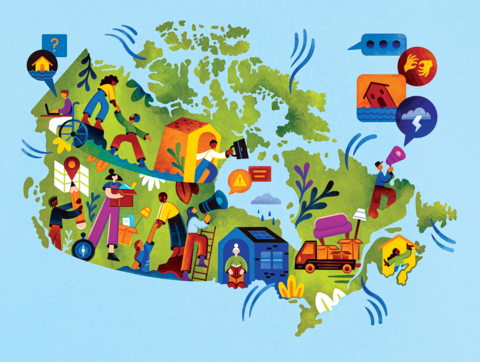Partnering for Climate Justice, Action & Adaptation

Illustration by Chanelle Nibbelink. Chanelle is a Canadian-American illustrator. She works with editorial, publishing, and advertising clients around the world to bring whimsy and fun to their projects. She applies her conceptual-thinking, shape-based style and boundless curiosity to all of her professional and personal projects. Learn more about Chanelle and her work at chanellenibbelink.com.
2022 Projects & Partnerships
Learn more about Partners for Action (P4A)’s research and partnerships in our 2022 Annual Report (PDF).
Effective Property Buyout Programs to Reduce Flood Risk in a Changing Climate
funded by the Max Bell Foundation
Within the coming decades, millions of people around the globe will lose their homes to climate change. Managed retreat, or the purposeful, coordinated movement of people and property out of areas vulnerable to flooding, is, therefore, becoming increasingly important. P4A provides strategic advice to federal, provincial and territorial governments, as well as municipalities, to equip policymakers and practitioners with evidence-based guidance about how to design and implement effective property buyout programs.
In Spring 2023, we released the full report and hosted a webinar to share our findings and recommendations.
Read the final report, Buying Out the Floodplain: Recommendations for Strategic Relocation Programs in Canada.
Inclusive Resilience
with the Canadian Red Cross, funded by Public Safety Canada
This project studies how people learn about and prepare for floods, wildfires and earthquakes in their communities, and how to assess and map socioeconomic vulnerability and flood risk. The purpose was to better understand where those who are most impacted by these natural hazards live to improve and refine risk communications and outreach. The end goal is to improve messaging, in all forms, around these emergencies – including planning and recovery. This study is underpinned by the development of P4A’s Social Vulnerability Index (SoVI), which enables analysis of the combined impacts of exposure to hazard risk and socio-economic vulnerability.
The research and analysis phases of the study are now complete and the full report from the communications study will be available in Spring 2023. SoVI and flood risk methodologies, case studies, an analysis of implications for Indigenous communities, and applications in relation to environmental justice have been published in a series of journal articles.
Read the Executive Summary of our forthcoming report, Inclusive Resilience: Pathways to Building Awareness and Preparedness Among At-Risk Populations in Canada.
What’s next?
- A guide to assessing and mapping flood risk using a SoVI and a series of associated web-based maps of hotspots are being developed.
Water is our Friend
with the Buoyant Foundation Project, funded by New Frontiers in Research Fund – Exploration
There are deep inequalities in Canada’s current flood context associated with colonization practices, whose legacy has pushed Indigenous communities onto land that is disproportionately exposed to flood risks. In many instances, dominant flood risk reduction (FRR) strategies have proven unreliable and ineffective for Indigenous communities. Working together with Indigenous partners, this project aims to explore how the integration of Traditional Knowledge (TK), Western science, and engineering can inform approaches to climate adaptation opportunities for remote Indigenous communities and support the design of culturally appropriate structures that are safe, resilient and suitable for Indigenous communities.
What’s next?
- Throughout 2023 and 2024, we will work with our First Nation partners to co-design and complete this project.
- Project deliverables include a workshop, a common set of terms and definitions to reflect understandings, literature and technology reviews, flood mapping simulations, safety guidelines appropriate for use by non-engineers, and presentations for Indigenous communities to generate further discussion about TK, appropriate materials and use cases of amphibious retrofit construction.
What we’re working on in 2023
We continue to work with a range of communities to advance flood resiliency in Canada.
We’ve started two projects this year:
- Resilient Retrofits: Adapting to Climate Change
Funded by Halifax Regional Municipality, Nova Scotia, this project aims to help the municipality meet their target of retrofitting their buildings to be more climate resilient by conducting a literature review to develop a database of resilient retrofits and content for a retrofitting guidebook.
- Data for Flood Resilience: Building Evidence for Equity-Informed Investment, Planning and Foresight
Funded by Co-operators, this project aims to generate pathways for integrating an equity lens in disaster risk management with the goal of reducing the impacts of flooding (and other hazards) in Canada.
Our 2022 Annual Report (PDF) is now available. Please read and share!
